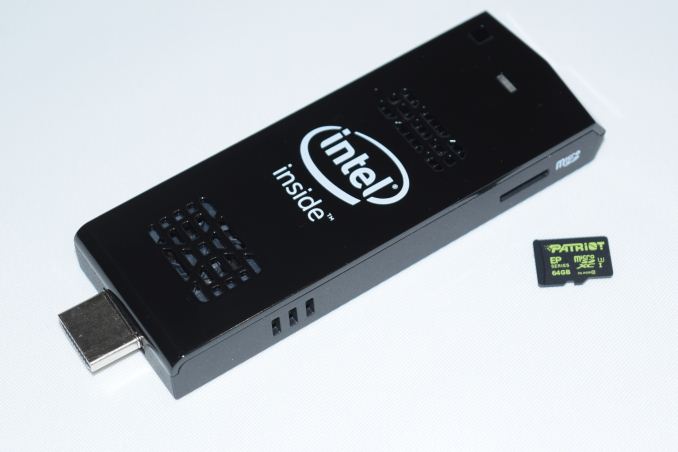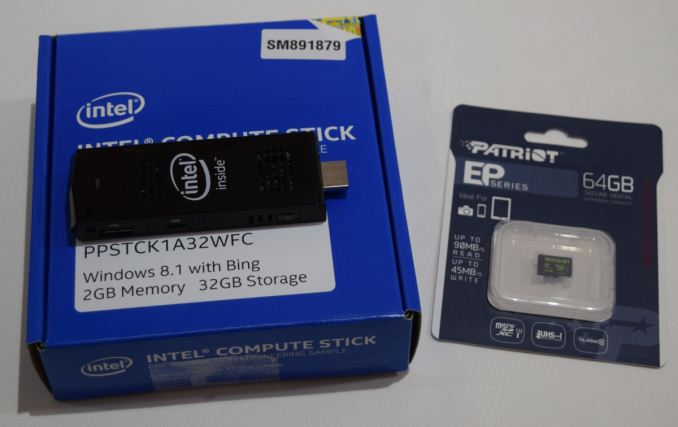Intel PPSTCK1A32WFC Bay Trail-T Compute Stick Review
by Ganesh T S on April 22, 2015 11:00 AM EST- Posted in
- Systems
- Intel
- Bay Trail
- HDMI Stick

Introduction and Setup Impressions
The success of the ultra-compact form factor (UCFF) PCs have made vendors realize that small and power-efficient computing platforms are here to stay. ARM SoC vendors, finding that the tablet market had reached saturation, kickstarted a new product category in the form of 'HDMI sticks'. As a computing platform, they were smaller than the ultra-compact form factor PCs - just looking like an oversized USB key. Intel announced the Compute Stick at CES to bring one of the first Wintel platforms into this space. Late last month, Google also introduced the Chromebit, a Chrome OS-based HDMI stick. Both of these point to the 'stick' computing platform being more than just a passing fad. The Intel Compute Stick we are reviewing today comes with Windows 8.1 with Bing (32-bit) pre-installed, making it ready to roll right out of the box.
The specifications of our Intel PPSTCK1A32WFC review configuration are summarized in the table below.
| Intel PPSTCK1A32WFC Specifications | |
| Processor | Intel Atom Z3735F (4C/4T x 1.33 GHz, 22nm, 2MB L2, 2.2W SDP) |
| Memory | 1x 2GB DDR3L-1333 C9 |
| Graphics | Intel HD Graphics |
| Disk Drive(s) | Samsung MBG4GC 32 GB eMMC |
| Networking | 1x1 Realtek RTL8723BS 802.11n W-Fi |
| Audio | Capable of 5.1/7.1 digital output with HD audio bitstreaming (HDMI) |
| Operating System | Windows 8.1 with Bing x86 |
| Pricing (As configured) | USD 150 |
| Full Specifications | Intel PPSTCK1A32WFC Specifications |
The Atom Z3735F belongs to the Bay Trail-T family - the set of SoCs with Silvermont Atom cores that target the tablet market. Analysis of the Bay Trail SoCs has already been done in some of our previous reviews.
The Intel PPSTCK1A32WFC kit comes with the OS pre-installed. The drivers are available from Intel's site. In addition to the main unit, the other components of the package include a 10 W (5V @ 2A) adapter with a USB port along with a USB Type A to micro-USB cable, a HDMI extender cable and different detachable power plugs for usage anywhere around the world.
We had a very difficult experience managing our ECS LIVA review with just 32 GB of eMMC storage. Fearing a similar situation, we decided to augment our review unit with a Patriot EP series 64 GB microSDXC card.
In the table below, we have an overview of the various systems that we are comparing the Intel PPSTCK1A32WFC against. Note that they may not belong to the same market segment. In fact, the review model is the only one of its kind that we have evaluated so far. That said, we are including systems that have comparable cost - so that users can get an idea of how much they are sacrificing or gaining with the stick form factor. The relevant configuration details of the machines are provided so that readers have an understanding of why some benchmark numbers are skewed for or against the Intel PPSTCK1A32WFC when we come to those sections.
| Comparative PC Configurations | ||
| Aspect | Intel PPSTCK1A32WFC | |
| CPU | Intel Atom Z3735F | Intel Atom Z3735F |
| GPU | Intel HD Graphics | Intel HD Graphics |
| RAM | 2GB DDR3L 9-9-9-24 @ 1333 MHz |
2GB DDR3L 9-9-9-24 @ 1333 MHz |
| Storage | Samsung eMMC MBG4GC (32 GB; eMMC 5.0-compatible) |
Samsung eMMC MBG4GC (32 GB; eMMC 5.0-compatible) |
| Wi-Fi | Realtek RTL8723BS 802.11n SDIO Network Adapter (1x1 802.11n - 150 Mbps) |
Realtek RTL8723BS 802.11n SDIO Network Adapter (1x1 802.11n - 150 Mbps) |
| Price (in USD, when built) | $150 | $150 |












103 Comments
View All Comments
mkozakewich - Friday, April 24, 2015 - link
I'd just get a $100 WinBook and mount it to the back of the monitor.Teknobug - Saturday, April 25, 2015 - link
The wifi network in these little things are usually terrible.Eric_WVGG - Monday, April 27, 2015 - link
“Intel announced the Compute Stick […] Late last month, Google also introduced the Chromebit. Both of these point to the 'stick' computing platform being more than just a passing fad.”That doesn’t logically follow at all. Intel and Google and the rest of the PC industry produce tons of things that nobody buys.